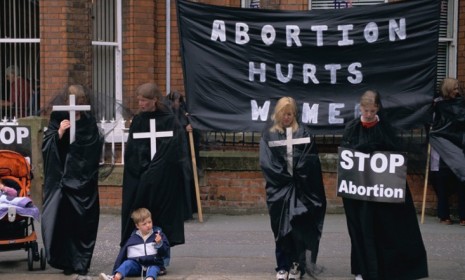Is South Dakota wrong to tell women that abortion could lead to suicide?
An appeals court inspires fury by ruling that women seeking abortions must be warned of an increased risk of suicide — despite shaky evidence of that link

A South Dakota appeals court ruled this week that doctors must tell women seeking abortions that they could be more prone to kill themselves if they have the procedure — even though the supposed link between abortion and suicide is based on arguably bogus evidence. The appeals court ruled 7-4 that conclusive proof of causation was not required, enraging abortion-rights activists who argue that the new rule puts an added burden on women seeking abortions — which would be unconstitutional according to Roe v. Wade. Has South Dakota gone too far? Here, a guide:
First off: What's the connection between abortion and suicide?
The anti-abortion groups championing the ruling cite two "widely circulated studies that found an 'increased' suicide risk" among women who had abortions, says Kay Steiger at The Raw Story. But there's a problem: The studies did not determine "that abortion caused the increased risk." In fact, the American Psychological Association called the link "misleading," stating that "the best scientific evidence indicates that the relative risk of mental health problems among adult women who have an unplanned pregnancy is no greater if they have an elective first-trimester abortion than if they deliver [the baby]."
The Week
Escape your echo chamber. Get the facts behind the news, plus analysis from multiple perspectives.

Sign up for The Week's Free Newsletters
From our morning news briefing to a weekly Good News Newsletter, get the best of The Week delivered directly to your inbox.
From our morning news briefing to a weekly Good News Newsletter, get the best of The Week delivered directly to your inbox.
What does the court say?
Judge Raymond Gruender wrote that "various studies found this correlation to hold," and added that "there is nothing in the record to suggest that abortion as a cause [of suicidal thoughts] has been ruled out with certainty. As a result, the disclosure of the observed correlation as an 'increased risk' is not unconstitutionally misleading or irrelevant."
Can abortion-rights groups fight the ruling?
No. "Tuesday's ruling was the final piece in the fight over the law's constitutionality," says Kristi Eaton at The Associated Press.
A free daily email with the biggest news stories of the day – and the best features from TheWeek.com
Will this stop women from getting abortions?
Time will tell. And remember, South Dakota "has spent the last few years making access to abortion the most taxing and violating experience ever," says Feministing. It was also the first state to have an informed consent law — which requires abortion providers to give women certain information before they undergo the procedure — and last year mandated the longest waiting period in the nation, 72 hours, and a meeting at an anti-abortion counseling center before a woman can get an abortion, says David Bailey at Reuters.
Sources: The Associated Press, Feministing, The Raw Story, Reuters, The Wall Street Journal
Frances is a senior editor at TheWeek.com, managing the website on the early morning shift and editing stories on everything from politics to entertainment to science and tech. She's a graduate of Yale and the University of Missouri journalism school, and has previously worked at TIME and Real Simple. You can follow her on Twitter and on Tumblr.
-
 Grok in the crosshairs as EU launches deepfake porn probe
Grok in the crosshairs as EU launches deepfake porn probeIN THE SPOTLIGHT The European Union has officially begun investigating Elon Musk’s proprietary AI, as regulators zero in on Grok’s porn problem and its impact continent-wide
-
 ‘But being a “hot” country does not make you a good country’
‘But being a “hot” country does not make you a good country’Instant Opinion Opinion, comment and editorials of the day
-
 Why have homicide rates reportedly plummeted in the last year?
Why have homicide rates reportedly plummeted in the last year?Today’s Big Question There could be more to the story than politics
-
 The billionaires’ wealth tax: a catastrophe for California?
The billionaires’ wealth tax: a catastrophe for California?Talking Point Peter Thiel and Larry Page preparing to change state residency
-
 Bari Weiss’ ‘60 Minutes’ scandal is about more than one report
Bari Weiss’ ‘60 Minutes’ scandal is about more than one reportIN THE SPOTLIGHT By blocking an approved segment on a controversial prison holding US deportees in El Salvador, the editor-in-chief of CBS News has become the main story
-
 Has Zohran Mamdani shown the Democrats how to win again?
Has Zohran Mamdani shown the Democrats how to win again?Today’s Big Question New York City mayoral election touted as victory for left-wing populists but moderate centrist wins elsewhere present more complex path for Democratic Party
-
 Millions turn out for anti-Trump ‘No Kings’ rallies
Millions turn out for anti-Trump ‘No Kings’ ralliesSpeed Read An estimated 7 million people participated, 2 million more than at the first ‘No Kings’ protest in June
-
 Ghislaine Maxwell: angling for a Trump pardon
Ghislaine Maxwell: angling for a Trump pardonTalking Point Convicted sex trafficker's testimony could shed new light on president's links to Jeffrey Epstein
-
 The last words and final moments of 40 presidents
The last words and final moments of 40 presidentsThe Explainer Some are eloquent quotes worthy of the holders of the highest office in the nation, and others... aren't
-
 The JFK files: the truth at last?
The JFK files: the truth at last?In The Spotlight More than 64,000 previously classified documents relating the 1963 assassination of John F. Kennedy have been released by the Trump administration
-
 'Seriously, not literally': how should the world take Donald Trump?
'Seriously, not literally': how should the world take Donald Trump?Today's big question White House rhetoric and reality look likely to become increasingly blurred